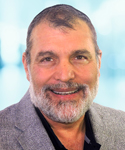Edited on Feb. 1, 2021: Technology and communication have been vital to many rheumatology practices throughout the COVID-19 pandemic, allowing providers to quickly deploy solutions and respond to patient needs, according to Howard M. Busch, DO. As part of our ongoing series discussing the effects of the COVID-19 pandemic on rheumatology, Dr. Busch shares his insights and experiences with The Rheumatologist (TR).
In 1987, Dr. Busch founded the Family Arthritis Center, Loxahatchee, Fla. He is also the founder and president of American Arthritis and Rheumatology Associates (AARA), a large U.S. rheumatology group. Dr. Busch is a noted national speaker and a member of the speaker’s bureau of numerous pharmaceutical companies. He has also been an investigator for numerous clinical trials and holds five patents.
Dr. Busch obtained his Bachelor of Science from Hobart and William Smith Colleges, Geneva, N.Y. For his medical studies, he attended the New York College of Osteopathic Medicine at the New York Institute of Technology. He interned at Metropolitan Hospital, Philadelphia, and completed a medical residency at Norwalk Hospital, Connecticut, which is affiliated with Yale University. He served as chief medical resident and an instructor at Yale.
For his rheumatology fellowship, Dr. Busch attended the University of Medicine and Dentistry, Newark, N.J., where he was awarded the Northeast Regional Fellow Award for Research and selected the chief fellow.
Dr. Busch’s wife, Stacey Busch, RN, BSN, MA, CRHC, originally trained as an oncology clinician, “saw the light” and now serves as Dr. Busch’s practice manager and AARA consultant. They have three beautiful daughters and a growing family of eight grandchildren. In his free time, Dr. Busch is an avid swimmer.
TR: How has your practice changed to meet the demands of the pandemic?
Dr. Busch: We have drastically improved communication with our patients by using our technology to broadcast informational telephone blasts to our patients about the pandemic, how it could impact their health and what to do. We have also increased the use of telemedicine, including for those patients who are concerned about the risk of exposure to SARS-CoV-2, so they can stay in the comfort of their homes and still have a visit.
We have also become much more cognizant about cleanliness and social distancing. We limit the number of patients in the welcome room at any given time and are much more disciplined regarding sanitation policies.
TR: Has the pandemic affected the financial viability of your practice? In short, how is your practice coping?
Dr. Busch: The pandemic did not affect the financial viability of my practice or those of my AARA powered by Bendcare peers. We did not have to lay off staff, and we do not anticipate any negative long-term financial impacts. In fact, we are coping extremely well. We have not taken a dime from the government, and when it was offered to us, we returned it. That speaks volumes about the power of a large group having a working relationship with a company such as Bendcare.




